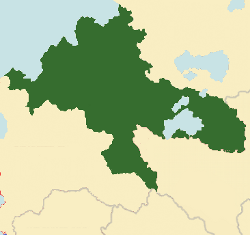Anagonia-Yohannes
Empire of Anagonia-Yohannes
Anagonisch-Yohannisches Kaiserreich
Kekaisaran Anagonia-Yohannes. . . . . . . .. . . . . . . .. . . . . . . . . . .. . . . . . . . .. . . .
Flag . . . . . . . . . . . . .. . . . . .. . . . . . . .. . . .. . . .. . . . . . .. . . . . . . .. . . . . . . . . . .. . . . . . . . .. . . . . . . . . . . . . . .. . . . . . . .. . Seal
Motto: “Audemus jura nostra defendere”
Anthem: Einigkeit und Recht und Freiheit
Mainland Anagonia-Yohannes in Judea
Located in: Judea
Capital: Valedonia
Largest City: Valedonia
Official Language: Austrian Standard,
Bahasa Indonesia, English, Valedonian
Demonym: Anago-Yohannesian
Government: Constitutional Union of Monarchy.
Federal Bicameral Parliamentary Monarchy
King-Emperor:
- Hamengkubuwono II
First Minister
- Ceara Bickerton MP
Legislature: Imperial Diet
- Upper House Aristocratic Assembly
- Lower House Imperial Senate
Area
Total: 60,883,696 km2
Population
2010 estimate: 14,763,904,554
- Mainland (Judea): 8,031,913,247
- Overseas (Tyrrhenia and Europa): 6,731,991,307
Density: 242.5 persons / sq km
GDP (PPP): 2010 estimate
Total: $541.74 trillion
Per Capita: $39,027
GDP (Nominal): 2010 estimate
Total: $548.03 trillion
Per Capita: $39,480
Gini: 35
HDI:0.971 (very high)
Currency: Kroten (β)
Time Zone: NWETZ +7
Date Format: dd-mm-yyyy (CE)
Drives on the: Right
Internet TLD: .kk
Calling Code: +585
It shares maritime borders with the Judean Arctic Sea to the west, and land borders with Vlack Sturm to the north, Tergnitz to the southeast, and Altimaea to the south.
Anagonia-Yohannes is supervised by a bicameral parliamentary system, governed by an Imperial and Royal Authority led by a First Minister and a Federal President of Parliament, and represented internationally by a largely ceremonial head of state with the official title "King of Yohannes and Emperor of Anagonia". The King-Emperor is recognised constitutionally as a figurative head of state of the Imperial and Royal sovereignty.
In foreign affairs policy, a gradual move towards isolationism throughout the late 20th century and early 21st century has been indicated by the previous two successive ruling government, with approximately one out of three of its population within the most recent official governmental poll, choosing a more isolationist stance towards the Dual Empire's foreign and international relations, to preserve its peaceful international reputation.
Anagonia-Yohannes is one of the founding members of Incursus and the Ryberg Institute of Mutual Trade, and it is known internationally for its Ge&T index listed major corporations such as that of VMK AG, Yohannesische Bundesbank, and Yohannesische Börse AG.
ContentsI. History
II. Geography
III. Politics and government3.1 Government
IV. Economy
3.2 Politics
3.3 Foreign affairs and relations
3.4 Military4.1 Corporations
V. Demographics
4.2 Transport
4.3 Energy
4.4 Agriculture5.1 Urbanisation
VI. Culture
5.2 Languages
5.3 Religion
5.4 Education
5.5 Healthcare and Social Welfare6.1 Architecture
6.2 Media
6.3 Arts




